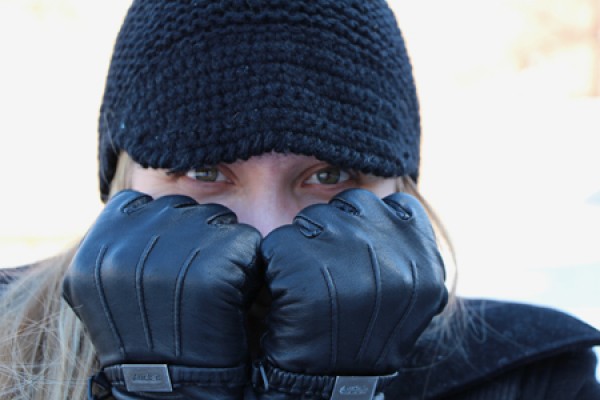It was cold in Windsor on Wednesday, but hearing testimonies to the winners of Employee Recognition Awards was enough to warm anyone’s heart, chief human resources officer Rita LaCivita told a reception gathered in Vanier Hall to honour the inaugural group of award recipients.
“All these positive comments in the nominations help us to realize the many ways our employees are providing excellent service to clients across campus,” LaCivita said. “We are so excited to be able to celebrate the outstanding contributions of our employees to the achievement of the University’s mission and vision.”
The human resources department introduced the Employee Recognition Awards program in July 2012; Thursday marked the first set of awards.
“This award program provides opportunities for all employees to be recognized for their outstanding service to the University,” said LaCivita. “Being recognized and recognizing others builds a supportive and positive workplace and contributes to making the University of Windsor the best place to work and learn.”
Jonathan Sinasac, videoconferencing and multimedia engineering specialist in the Centre for Teaching and Learning, received the Service Excellence – Individual award, presented to someone who consistently delivers service that exemplifies the UWindsor Service Standards.
Testimonies supporting his nomination included: “He has a reputation for meticulous attention to detail, intelligent design, respect for others, and effective teamwork. Although his work is highly technical, his focus is always on people, what they need, what will help them and how to make technology work for them
The Service Excellence – Team award went to the Paul Martin Law Library, and included Annette Demers, Helga Dienesch, Selma Eren, Marianne Grayce, Shafqat Hanif, Mary Jane Hutchinson, Vicki Jay Leung, Lisa Milne, Christina Olsen, Norman Saxon, Tracy Schulz, Danielle Stiller, Pauline Strong and housekeeper Pauline Benoit.
Among the comments offered in support were: “The team strives for accuracy, courtesy and helpfulness in their approach to all persons making requests” and “Each staff member keeps a notebook to record new ideas to improve service. These are shared at staff meetings and are followed up.”
The nominations committee identified two recipients for the Excellence in Leadership Award, Pierre Boulos and Mike Havey.
Dr. Boulos is chair of the Research Ethics Board; his nominators wrote: “His dedication to ethical scholarship and insightful leadership of the University’s REB has made him a role model for REB members and other REBs,” and “By fostering respect among diverse researchers and stakeholders, he encourages others to take pride in the collective quality of our scholarship.”
Havey, associate athletic director in Athletics and Recreational Services, was cited for his hard work and ethical approach to every facet of his job. “In recent years, the accomplishments of our varsity programs have been outstanding and Mike has driven this success through his student-comes-first approach,” wrote one nominator. Another offered “His leadership style builds relationships and trust among his peers allowing for a very supportive response to every day challenges.”
The Innovation Award, in recognition of innovations that enhance teaching, learning and service delivery, went to the team that produced the My UWindsor student mobile app, comprised of members from Information Technology Services: Shawn Denhartogh, Nick Keren, Jay Lamont, Vlad Pavlovic, Marcin Pulcer, Christopher Ribble and Eyob Woldemichael, as well as Paul Green and John Powell of Public Affairs and Communications.
“This group of highly skilled and dedicated professionals pooled their exceptional talents to craft an impressive very functional application in a very short period of time,” wrote their nominator. “By focusing on student needs, the team created a work environment that focused on developing a cutting edge state of the art application that rivals any University mobile application.”
Mary Lou Scratch, administrative assistant to the director of the Great Lakes Institute for Environmental Research, won the “U” Make a Difference Award, in recognition of her commitment to building a sense of community through volunteerism.
Among her volunteer efforts are serving as a member of the Campus Safety Audit Committee and fire safety warden for the institute’s building, assisting with donations to aid the breakfast program at St. Francis elementary school, organizing the GLIER Adopt-a-Family effort and canvassing for the United Way.
The Central Safety Committee presented the Excellence in Health and Safety Award to grounds supervisor Garry Moore of Facility Services. The award recognizes individuals who foster a culture of health and safety in the workplace.
Moore has initiated and achieved several safety improvements, including a comprehensive safety program for the grounds staff, which included improved safety equipment in the department, the development of safe operating procedures, and more safety training.
Dozens of UWindsor staff and faculty attended Wednesday’s reception, which president Alan Wildeman called “a tremendous opportunity to kick off this new way of recognizing the great employees we have on our campus.”
Award winner Boulos said he was honoured to be recognized, but was also quick to acknowledge the award points to the value of the work done by his colleagues.
“The culture of ethics at this university is shown through the great research that faculty, staff, and students carry out,” he said.





